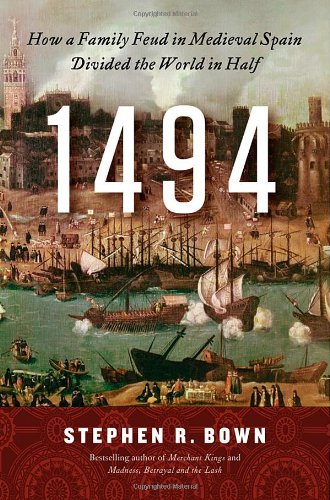

Most ebook files are in PDF format, so you can easily read them using various software such as Foxit Reader or directly on the Google Chrome browser.
Some ebook files are released by publishers in other formats such as .awz, .mobi, .epub, .fb2, etc. You may need to install specific software to read these formats on mobile/PC, such as Calibre.
Please read the tutorial at this link: https://ebookbell.com/faq
We offer FREE conversion to the popular formats you request; however, this may take some time. Therefore, right after payment, please email us, and we will try to provide the service as quickly as possible.
For some exceptional file formats or broken links (if any), please refrain from opening any disputes. Instead, email us first, and we will try to assist within a maximum of 6 hours.
EbookBell Team

4.3
88 reviewsIn 1494, award-winning author Stephen R. Bown tells the untold story of the explosive feud between monarchs, clergy, and explorers that split the globe between Spain and Portugal and made the world’s oceans a battleground.
When Columbus triumphantly returned from America to Spain in 1493, his discoveries inflamed an already-smouldering conflict between Spain’s renowned monarchs, Ferdinand and Isabella, and Portugal’s João II. Which nation was to control the world’s oceans? To quell the argument, Pope Alexander VI—the notorious Rodrigo Borgia—issued a proclamation laying the foundation for the Treaty of Tordesillas of 1494, an edict that created an imaginary line in the Atlantic Ocean dividing the entire known (and unknown) world between Spain and Portugal.
Just as the world’s oceans were about to be opened by Columbus’s epochal voyage, the treaty sought to limit the seas to these two favored Catholic nations. The edict was to have a profound influence on world history: it propelled Spain and Portugal to superpower status, steered many other European nations on a collision course, and became the central grievance in two centuries of international espionage, piracy, and warfare.
The treaty also began the fight for “the freedom of the seas”—the epic struggle to determine whether the world’s oceans, and thus global commerce, would be controlled by the decree of an autocrat or be open to the ships of any nation—a distinctly modern notion, championed in the early seventeenth century by the Dutch legal theorist Hugo Grotius, whose arguments became the foundation of international law.
At the heart of one of the greatest international diplomatic and political agreements of the last five centuries were the strained relationships and passions of a handful of powerful individuals. They were linked by a shared history, mutual animosity, and personal obligations—quarrels, rivalries, and hatreds that dated back decades. Yet the struggle ultimately stemmed from a young woman’s determination to defy tradition and the king, and to choose her own husband.